初三英语第8单元学习笔记
八年级上册英语第八单元知识点笔记

八年级上册英语第八单元知识点笔记
八年级上册英语第八单元知识点包括以下内容:
1.动词的时态:一般现在时、一般过去时、现在进行时、过去进
行时、一般将来时、现在完成时等。
2.名词的数:可数名词单数和复数形式的变化规则,特殊名词复
数形式。
3.动词的分词形式:现在分词和过去分词的形成规则。
4.形容词和副词的比较级和最高级形式:变化规则和比较结构(as...as, not as...as,比较级加than,最高级加in)。
5.形容词性物主代词:形容词性物主代词的变化规则和使用方法。
6.情态动词:can, could, may, might, must, should等情态动
词的用法和表示不同情态的含义。
7.疑问句和特殊疑问句:疑问词(who, what, where, when, why, how等)的使用和调整句序。
8.被动语态:被动语态的构成和使用。
9.现在进行时和一般现在时的区别:现在进行时表示现阶段正在进行的动作,一般现在时表示经常发生或客观事实。
10.时态的转换:根据语境变化时态,如将直接引语变为间接引语时态的转换。
以上是八年级上册英语第八单元的主要知识点,准确理解和掌握这些知识点,能够有效提高英语学习能力。
九年级上册英语第八单元笔记

九年级上册英语第八单元笔记一、单元概览本单元主要围绕“旅游”这一主题展开,介绍了不同国家的风土人情、旅游景点以及旅游相关的日常用语。
通过本单元的学习,学生可以了解世界各地的文化,提高英语交际能力,同时掌握与旅游相关的词汇和表达方式。
二、重点词汇destination: 目的地historic: 历史的,有历史意义的architecture: 建筑local: 当地的souvenir: 纪念品host: 主人schedule: 时间表,计划三、重点句型Have you been to ...? 你去过...吗?What is the capital of ...? ...的首都是哪里?How can I get to ...? 我怎么去...?What is the local specialty? 当地特色是什么?When is the best time to visit ...? 什么时候是参观...的最佳时间?四、语法重点现在完成时(Present Perfect Tense)的用法,例如:I have been to Beijing before.疑问句和陈述句的语序及构成。
五、日常交际用语Let me show you around. 我带你四处看看。
I am planning to visit ... next summer. 我计划明年夏天去...。
Can you recommend some places to visit? 你能推荐一些地方参观吗?What is the weather like in ...? ...的天气怎么样?How much does it cost to get there? 到那里要花多少钱?六、文化背景知识本单元介绍了不同国家的著名旅游景点和风土人情,包括美国的白宫、英国的大本钟、法国的埃菲尔铁塔等。
此外,还介绍了不同国家的礼仪习俗和饮食文化,帮助学生更好地了解世界各地的文化差异。
八年级上册英语书第八单元笔记

八年级上册英语书第八单元笔记以下是八年级上册英语书第八单元的笔记,包括重点单词、短语、句型和语法知识点:重点单词:1. ability能力2. achieve达成,获得3. almost几乎4. also也5. another另一个6. because因为7. better更好的8. both两者都9. catch抓住10. change改变重点短语:1. a lot of=lots of许多2. be able to能够3. be afraid of害怕4. be different from与……不同5. be full of充满6. be ready to准备7. both…and…两者都……8. because of因为,由于9. be sure to一定,务必10. break off折断重点句型:1. I think I can do it.我认为我能做到。
2. What do you think of…?你认为……怎么样?3. It is not difficult for me to do sth.对我来说做某事不难。
4. I hope to do sth.我希望做某事。
5. I am sure that…我确信……6. I’m sorry to hear that…听到……我很难过。
7. It is important for sb to do sth对某人来说做某事很重要。
8. It is+adj+for sb+to do sth对某人来说做某事……9. It is+adj+of sb+to do sth某人做某事……10. What are you doing when…?当……你在做什么?重点语法知识点:1. 学习现在进行时表将来的用法。
当表示计划或安排将要发生的动作时,用现在进行时表示。
结构为be going to+动词原形。
注意与一般现在时表将来的区别。
一般现在时表示按计划或安排将要发生的动作,而现在进行时表示将来的动作是已经计划好的,并且强调动作的紧迫性。
九年级英语九单元笔记
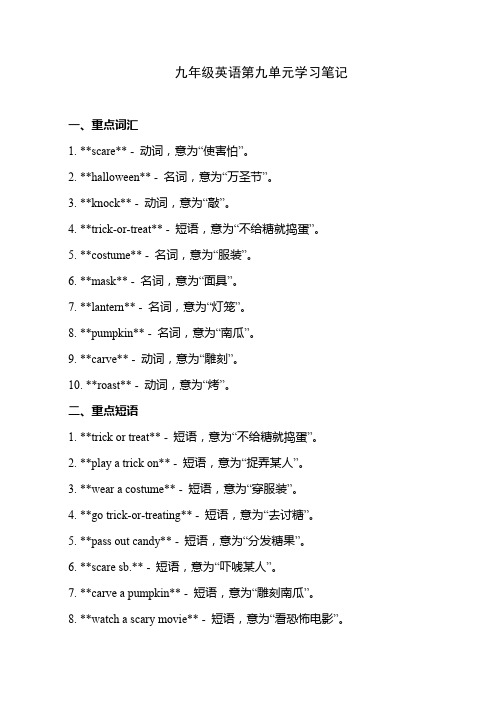
九年级英语第九单元学习笔记一、重点词汇1. **scare** -动词,意为“使害怕”。
2. **halloween** -名词,意为“万圣节”。
3. **knock** -动词,意为“敲”。
4. **trick-or-treat** -短语,意为“不给糖就捣蛋”。
5. **costume** -名词,意为“服装”。
6. **mask** -名词,意为“面具”。
7. **lantern** -名词,意为“灯笼”。
8. **pumpkin** -名词,意为“南瓜”。
9. **carve** -动词,意为“雕刻”。
10. **roast** -动词,意为“烤”。
二、重点短语1. **trick or treat** -短语,意为“不给糖就捣蛋”。
2. **play a trick on** -短语,意为“捉弄某人”。
3. **wear a costume** -短语,意为“穿服装”。
4. **go trick-or-treating** -短语,意为“去讨糖”。
5. **pass out candy** -短语,意为“分发糖果”。
6. **scare sb.** -短语,意为“吓唬某人”。
7. **carve a pumpkin** -短语,意为“雕刻南瓜”。
8. **watch a scary movie** -短语,意为“看恐怖电影”。
9. **have a Halloween party** -短语,意为“举办万圣节派对”。
10. **go trick-or-treating** -短语,意为“去讨糖”。
三、重点句型1. “What are you going to be for Halloween?” 你打算在万圣节穿什么服装?2. “We usually go trick-or-treating on Halloween.” 我们通常在万圣节去讨糖。
3. “My favorite part of Halloween is going trick-or-treating with my friends.” 我最喜欢的万圣节活动是和我的朋友一起去讨糖。
九年级上册英语第八单元单词笔记

九年级上册英语第八单元单词笔记Unit 8: Enriching the Mind1. talent [ˈtælənt] n. 天赋,才能- She has a talent for playing the violin.她有拉小提琴的天赋。
- He showed great talent in painting.他在绘画方面显示出了很大的才能。
2. potential [pəˈtɛnʃəl] n. 潜力,可能性- The young dancer has great potential.这位年轻的舞者有巨大的潜力。
- This student has the potential to be a great scientist.这位学生有成为伟大科学家的潜力。
3. measure [ˈmɛʒər] v. 测量;衡量;n. 措施,方法- The length of this table measures 2 meters.这张桌子的长度为2米。
- We need to take measures to protect the environment.我们需要采取措施保护环境。
4. fluent [ˈfluənt] adj. 流利的,流畅的- She is fluent in three languages.她精通三种语言。
- The speaker gave a fluent and engaging speech.演讲者做了一个流利而引人入胜的演讲。
5. creativity [ˌkriːeɪˈtɪvəti] n. 创造力,创造性- The artist's creativity is evident in his unique paintings.这位艺术家独特的绘画反映了他的创造力。
- The course aims to enhance students' creativity and innovation.该课程旨在提高学生的创造力和创新能力。
九上英语第八单元笔记
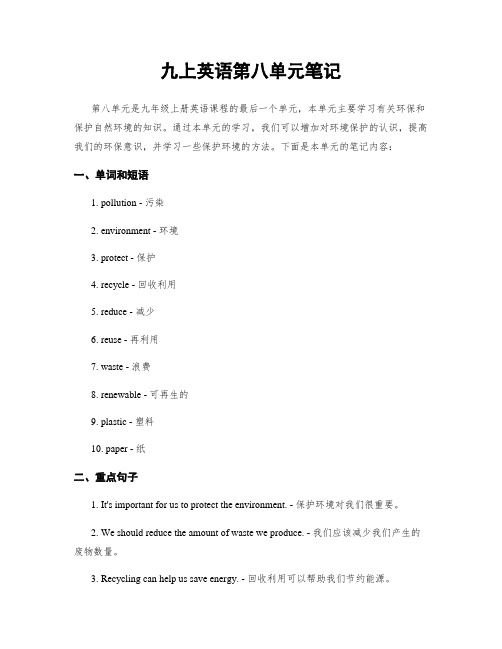
九上英语第八单元笔记第八单元是九年级上册英语课程的最后一个单元,本单元主要学习有关环保和保护自然环境的知识。
通过本单元的学习,我们可以增加对环境保护的认识,提高我们的环保意识,并学习一些保护环境的方法。
下面是本单元的笔记内容:一、单词和短语1. pollution - 污染2. environment - 环境3. protect - 保护4. recycle - 回收利用5. reduce - 减少6. reuse - 再利用7. waste - 浪费8. renewable - 可再生的9. plastic - 塑料10. paper - 纸二、重点句子1. It's important for us to protect the environment. - 保护环境对我们很重要。
2. We should reduce the amount of waste we produce. - 我们应该减少我们产生的废物数量。
3. Recycling can help us save energy. - 回收利用可以帮助我们节约能源。
4. We should reuse plastic bags instead of throwing them away. - 我们应该重复使用塑料袋,而不是扔掉它们。
5. Renewable energy sources like solar and wind power are better for the environment. - 太阳能和风能等可再生能源对环境更好。
三、重点知识1. Pollution: Pollution refers to the contamination of the environment by harmful substances or waste. It can be caused by various factors, including industrial activities, vehicle emissions, and improper waste disposal. Pollution has a negative impact on the environment, human health, and the overall ecosystem.2. Environment: The environment refers to the surroundings or conditions in which living organisms exist. It includes the natural elements such as air, water, and land, as well as the living organisms that inhabit them. Protecting the environment is essential for the sustainability of life on Earth.3. Protect: Protecting the environment involves taking measures to prevent or reduce the damage caused by human activities. This can be done through various means, such as implementing stricter regulations, promoting renewable energy sources, and raising awareness about the importance of environmental conservation.4. Recycling: Recycling is the process of converting waste materials into reusable materials. It helps to conserve natural resources, reduce energy consumption, and minimize the amount of waste that goes into landfills. Common recyclable materials include paper, plastic, glass, and metal.5. Reduce and Reuse: Reducing and reusing are important principles of waste management. By reducing the amount of waste we produce and reusing items instead of throwing them away, we can minimize the negative impact on the environment. This can be done through practices such as using reusable water bottles, shopping bags, and opting for digital media instead of printed materials.四、学以致用1. Take action: Each of us has a role to play in protecting the environment. We can start by making small changes in our daily lives, such as turning off lights when not in use, using public transportation, and separating recyclables from non-recyclables. Encourage others to do the same and raise awareness about the importance of environmental conservation.2. Get involved: Join environmental organizations or participate in community initiatives related to environmental protection. This can include volunteering for clean-up activities, tree planting, or lobbying for stricter environmental regulations. Together, we can make a difference and create a sustainable future for generations to come.总结:九上英语第八单元主要学习了环保和保护自然环境的知识。
八年级上册英语第8单元笔记

八年级上册英语第8单元笔记
以下是八年级上册英语第8单元的笔记,涵盖了本单元的重点词汇、短语、句型和语法知识点:
1. 重点词汇:
hurt 伤害,受伤
ankle 脚踝
knee 膝盖
elbow 肘部
head 头
cut 割伤,切伤
hurt oneself 受伤
2. 重点短语:
go to the hospital 去医院
be careful 当心,小心
be careful not to do sth. 当心不要做某事
be careful with sth. 对某事小心
3. 重点句型:
I hope you feel better soon. 我希望你很快好起来。
Don’t worry. It’s not serious. 别担心,不严重。
What should you do if you cut yourself? 如果割伤了自己,你应该怎么做?
4. 语法知识点:
现在进行时表示正在进行的动作或正在发生的事情,结构为“be + -ing”。
现在进行时的否定形式是在be动词后面加not,例如“I am not doing my homework”。
现在进行时的一般疑问句形式是在be动词前面加助动词“Are”,例如“Are you doing your homework?”。
5. 学习建议:
多听录音,模仿发音和语调。
多做笔记,积累词汇和短语。
多练习写作和口语,提高语言表达能力。
注意语法规则和句子结构,避免出现错误。
人教版八下英语u8笔记

人教版八下英语u8笔记
以下是有关人教版八下英语u8的笔记,供您参考:
Unit 8 grammar
一、被动语态的构成:
被动语态由助动词be和及物动词的过去分词构成,其基本结构为“be+及物动词的过去分词”。
使用被动语态时需要根据时态和人称进行变化。
二、被动语态的时态:
被动语态有多种时态,包括一般现在时、一般过去时、一般将来时、现在进行时、过去进行时、现在完成时、过去完成时等。
具体形式如下:
1. 一般现在时:am/is/are+过去分词
2. 一般过去时:was/were+过去分词
3. 一般将来时:will be+过去分词
4. 现在进行时:am/is/are being+过去分词
5. 过去进行时:was/were being+过去分词
6. 现在完成时:have/has been+过去分词
7. 过去完成时:had been+过去分词
三、被动语态的用法:
被动语态常用于以下情况:
1. 不知道或不想指出动作的执行者。
2. 强调动作的承受者。
3. 在科技文献和新闻报道中,为了强调客观事实。
4. 在一些习惯用法中,如“It is said that…”(据说……)和“He will be invited to the party.”(他将受邀参加聚会。
)等。
四、主动语态与被动语态的转换:
将主动语态转换为被动语态的方法是将宾语变成主语,将谓语变成被动结构(be+过去分词),将原主语放在by后面,作为被动句中的宾语。
如果原主语不出现,被动句中常常以it作为形式主语。
九年级上册英语笔记第一单元人教版

九年级上册英语笔记第一单元人教版九年级上册英语第一单元笔记(人教版)一、重点单词。
1. textbook.- 名词,意为“教科书;课本”。
例如:Our textbooks are very useful for our study.(我们的课本对我们的学习非常有用。
)2. conversation.- 名词,“交谈;谈话”。
常用搭配:have a conversation with sb.(与某人交谈)。
例如:I had a long conversation with my teacher yesterday.(我昨天和我的老师进行了一次长谈。
)3. aloud.- 副词,“大声地;出声地”。
它和loudly的区别在于:aloud侧重于让人能听到,没有“喧闹”的意思;loudly侧重声音喧闹、嘈杂。
例如:Please read the text aloud.(请大声朗读课文。
)4. pronunciation.- 名词,“发音;读音”。
例如:His pronunciation is very good.(他的发音很好。
)5. sentence.- 名词,“句子”。
例如:Make a sentence with this word.(用这个单词造一个句子。
)6. patient.- 形容词,“有耐心的”;名词,“病人”。
例如:Our English teacher is very patient with us.(我们的英语老师对我们非常有耐心。
)- be patient with sb.(对某人有耐心)7. secret.- 名词,“秘密;秘诀”;形容词,“秘密的;保密的”。
例如:It's a secret between us.(这是我们之间的秘密。
)8. look up.- 动词短语,“(在词典、参考书中或通过电脑)查阅;抬头看”。
例如:If you don't know this word, you can look it up in the dictionary.(如果你不知道这个单词,你可以在词典里查阅它。
七上英语第八单元手写笔记

七上英语第八单元手写笔记英文回答:Unit 8 of my seventh-grade English textbook is about "Healthy Eating". In this unit, we learn about different types of food and how to make healthy food choices. We also learn about the importance of exercise and how itcontributes to our overall well-being. This unit is quite interesting as it teaches us how to take care of our bodies and make good decisions about what we eat.One of the main topics covered in this unit is the different food groups. We learn about the five main food groups: fruits, vegetables, grains, protein, and dairy.Each food group has its own benefits and provides essential nutrients that our bodies need to stay healthy. For example, fruits and vegetables are rich in vitamins and minerals, while grains provide us with energy. Protein helps buildand repair tissues, and dairy products are a good source of calcium for strong bones.Another important aspect of healthy eating that we learn about is portion control. It's not just about what we eat, but also how much we eat. Eating too much of any food, even if it's healthy, can lead to weight gain and other health problems. So, it's important to be mindful of our portion sizes and eat in moderation. For example, instead of having a large plate of pasta, we can have a smaller portion and add more vegetables to make it a balanced meal.In addition to learning about food groups and portion control, we also learn about the importance of reading food labels. Food labels provide important information about the nutritional content of the food we consume. By reading food labels, we can make informed choices and select foods that are low in sugar, salt, and unhealthy fats. For instance,if a food label indicates high levels of saturated fats, we can choose an alternative with lower levels to maintain a healthy diet.Furthermore, this unit emphasizes the significance of regular exercise in maintaining a healthy lifestyle.Exercise not only helps us stay physically fit but also improves our mental well-being. It can reduce stress, improve sleep, and boost our overall mood. For example, instead of spending hours watching TV or playing video games, we can engage in activities like swimming, cycling,or playing sports to get our bodies moving and stay healthy.To summarize, Unit 8 of my seventh-grade English textbook focuses on "Healthy Eating". We learn about the different food groups, portion control, reading food labels, and the importance of exercise. By understanding these concepts, we can make informed decisions about our diet and lead a healthy lifestyle. It's important to remember that taking care of our bodies is essential for our overallwell-being.中文回答:我七年级英语教科书的第八单元是关于“健康饮食”的。
人教版初三英语各单元知识点总结

初三英语各单元知识点详细总结Unit 1一、知识点1.Check in : 在旅馆的登记入住; Check out: 在旅馆结账离开;2.By: ①通过…..方式途径;例:I learn English by listening to tapes.②在…..旁边;例:by the window/the door③乘坐交通工具例:by bus/car④在……之前,到……为止;例:by October在10月前⑤被例:English is spoken by many people.3.how与what的区别:how通常对方式或程度提问,意思有:怎么样如何,通常用来做状语、表语;what通常对动作的发出者或接受者提问,意思为什么,通常做宾语,主语;①How is your summer holiday It’s OK.how表示程度做表语②How did you travel around the world I travel by air.③What do you learn at school I learn English, math and many other subjects.①What…think of… How…like…②What…do with… How…deal with…③What…like about… How…like…④What’s the weather like today How’s the weather today⑤What to do How to do itwhat I should do with how I should deal with it.What do you like about China =How do you like ChinaI don’t know what to do next step =I don’t know how to do it next step㊣What good / bad weather it is todayweather为不可数名词,其前不能加a㊣What a fine / bad day it is today day为可数名词,其前要加a4. aloud, loud与loudly的用法: 三个词都与"大声"或"响亮"有关;①aloud是副词,重点在出声能让人听见,但声音不一定很大,常用在读书或说话上;通常放在动词之后;aloud没有比较级形式;如: He read the story aloud to his son.他朗读那篇故事给他儿子听;②loud可作形容词或副词;用作副词时,常与speak, talk, laugh等动词连用,多用于比较级,须放在动词之后;如:She told us to speak a little louder. 她让我们说大声一点;③loudly是副词,与loud同义,有时两者可替换使用,但往往含有令人讨厌或打扰别人的意思,可位于动词之前或之后;如:He does not talk loudly or laugh loudly in public. 他不当众大声谈笑;5. voice 指人的嗓音也指鸟鸣;sound 指人可以听到的各种声音;noise 指噪音、吵闹声6. find + 宾语+ 宾补名词形容词介词短语分词等例:I find him friendly. I found him working in the garden.We found him in bed. He found the window closed.We found her honest.7. 常见的系动词有:①是:am 、is、are②保持:keep、stay③转变:become、get、turn④ ……起来feel、look、smell、taste、sound8. get + 宾语+宾补形容词过去分词动词不定式使某种情况发生例:Get the shoes clean. 把鞋擦干净Get Mr. Green to come. 让格林先生进来I want to get my bike repaired. 我想去修自行车You can’t get him waiting. 你不能让他老等着9. 动词不定式做定语①与所修饰的名词构成主谓关系The next train to arrive was from New York. He is always the first to come.②与所修饰的名词构成动宾关系I have nothing to say. I need a pen to write with.I need some paper to write on. I don’t have a room to live in.10. practice , fun 做名词为不可数名词11. add 补充说又说12. join 加入某团体并成为其中一员attend 出席参加会议或讲座join in与take part in指参加到某项活动中去;13.all、both、always以及every复合词与not连用构成部分否定;其完全否定为:all---none, both---neither, everything---nothing, everybody---nobody.14. be afraid of doing sth. / sth.害怕be afraid of being alonebe afraid to do sth.害怕be afraid that恐怕担心,表示委婉语气15.either:①放在否定句末表示“也”②两者中的“任一”③either…or…或者…或者.…引导主语部分,谓语动词按照就近原则16plete完成,是个较正式的词,后不能接动名词finish指日常事物的完成17.a,an 与序数词连用表示“又一”,“再一”;例:Please give me a second apple. There comes a fifth girl.18.have trouble/difficult/problem in doing….. 干…..遇到麻烦,困难19.unless 除非,如果不,等于“if not”本身就表示否定,引导条件状语从句,主句为将来时,条件状语从句用一般现在时表示将来;例:My baby sister doesn’t cry unless she’s hungry.=My baby sister doesn’t cry if she isn’t hungry.Unless you take more care, you’ll have an accident.如果你不多加小心的话,你会出事的;20.instead: adv. 代替,更换;例:We have no coffee, would you like tea instead我们没有咖啡了,改喝茶好吗It will take days by car, so let’s fly ins tead.开车去要好几天呢,咱们还是坐飞机吧;Tom was ill, so I went instead.汤姆病了,所以换了我去;instead of doing sth. 作为某人或某事物的替换例:Let’s play cards instead of watching TV.We sometimes eat rice instead of potatoes.Give me the red one instead of the green one.21.spoken 口头的,口语的;spoken English 口头英语speaking 讲话的,说某种语言的;Speaking skills讲英语的能力22. 提建议的句子:①What/ how about +doing sth. 如:What/ How about going shopping②Why don’t you + do sth. 如:Why don’t you go shopping③Why not + do sth. 如:Why not go shopping④Let’s + do sth. 如:Let’s go shopping⑤Shall we/ I + do sth. 如:Shall we/ I go shopping23. a lot 许多常用于句末如:I eat a lot. 我吃了许多;24. too…to 太…而不能常用的句型too+adj./adv. + to do sth.如:I’m too tired to say anything. 我太累了,什么都不想说;25. not …at all 一点也不根本不如:I like milk very much. I don’t like coffee at all.我非常喜欢牛奶;我一点也不喜欢咖啡;not经常可以和助动词结合在一起,at all 则放在句尾26.be / get excited about sth.=== be / get excited about doing sth.=== be excited to do sth. 对…感兴奋如:I am / get excited about going to Beijing.===I am excited to go to Beijing. 我对去北京感到兴奋;27. ① end up doing sth 终止做某事,结束做某事如:The party ended up singing. 晚会以唱歌而结束;② end up with sth. 以…结束如:The party ended up with her singing. 晚会以她的歌唱而告终;28. first of all 首先. to begin with 一开始later on 后来、随29. also 也、而且用于肯定句常在句子的中间either 也用于否定句常在句末too 也用于肯定句常在句末=as well30. make mistakes 犯错mistake sb. for …把……错认为……make mistakes in doing sth. 在干某事方面出错by mistake 错误地;由于搞错mistake---mistook----mistaken如:I often make mistakes. 我经常犯错;I mistook him for his brother.我错把他认成了他的哥哥;make a mistake 犯一个错误如:I have made a mistake.我已经犯了一个错误;31. laugh at sb. 笑话;取笑某人如:Don’t laugh at me不要取笑我32. take notes 做笔记,做记录33. enjoy doing sth . 喜欢做…乐意做… 如:She enjoys playing football. 她喜欢踢足球;enjoy oneself 过得愉快如:He enjoyed himself. 他过得愉快;34. native speaker 说本族语的人35. one of +the+ 形容词比较级+名词复数形式…其中之一如:She is one of the most popular teachers. 她是最受欢迎的教师之一;36. It’s +形容词+for sb. to do sth. 对于某人来说做某事…如:It’s difficult for me to study English.对于我来说学习英语太难了;句中的it 是形式主语,真正的主语是to study English37. practice doing 练习做某事如:She often practice speaking English. 她经常练习说英语;38. decide to do sth. 决定做某事如:LiLei has decided to go to BeiJing . 李雷已经决定去北京;39. deal with 处理如:I dealt with a lot of problem.40. worry about sb./ sth. 担心某人/ 某事如:Mother worried about his son just now. 妈妈刚才担心他的儿子;41. be angry with sb. 对某人生气如:I was angry with her. 我对她生气;42. perhaps === maybe 也许43. go by 时间过去如:Two years went by. 两年过去了;44. see sb. / sth. doing 看见某人正在做某事强调正在发生see sb. / sth. do 看见某人在做某事如:如:She saw him drawing a picture in the classroom.她看见他正在教室里画画;45. each other 彼此46. regard… as … 把…看作为…. 如:The boys regarded Anna as a fool. 这些男孩把安娜看成傻瓜;47. too many许多修饰可数名词如:too many girlstoo much许多修饰不可数名词如:too much milkmuch too太修饰形容词如:much too beautiful48. change…into…将…变为…如:The magician changed the pen into a book. 这个魔术师将这本书变为一本书;49. with the help of sb. == with one’s help 在某人的帮助下如:with the help of LiLei == with LiLei’s help 在李雷的帮助下50. compare … to …把…与…相比如:Compare you to Anna, you are lucky.你和安娜相比,你是幸运的;二、短语:1.by making flashcards 通过做单词抽认卡2. ask…for help 向某人求助3.read aloud 朗读4.that way =in that way 通过那种方式5.improve my speaking skills 提高我的会话技巧6.for example =for instance例如7.have fun 玩得高兴8.have conversations with friends 与朋友对话9.get excited 高兴,激动10.end up speaking in Chinese 以说汉语结束对话11.do a survey about… 做有关…的调查12.keep an English notebook 记英语笔记13.spoken English = oral English 英语口语14.make mistakes 犯错误15.get the pronunciation right 使发音准确16.practise speaking English 练习说英语17.first of all 首先18.begin with 以…开始ter on随后20.in class在课堂上ught at 嘲笑22.take notes 记笔记23.enjoy doing 喜欢干…24.write down 写下,记下25.look up v + adv 查找,查询26.native speakers 说本族话的人27.make up 编造,虚构,化妆,打扮28.around the world 全世界29.deal with 对待,处理,解决30.worry about be worried about 担心,担忧31.be angry with 生某人的气32.stay angry 生气33.go by 消逝34. regard…as… 把…当做…35plain about/of 抱怨36. change…into… 把…变成… = turn into37.with the help of 在…的帮助下38. compare…to with… 把…和…作比较39.think of think about 想起,想到40.physical problems身体上的问题41.break off 中断,突然终止42. not…at all 根本不,全然不三、句子1.How do you study for a test 你怎样为考试做准备2.I have learned a lot that way. 用那种方法,我已经学到了很多东西;3.It’s too hard to understand the voice. 听懂那些声音太难了;4.Memorizing the words of pop songs also helped a little.记流行歌曲的词也起作用;5. Wei Ming feels differently. 卫明有不同的感受;6.He finds watching movies frustrating. 他觉得看电影让人感到沮丧.7.She added that having conversations with friends was not helpful at all.她又说和朋友对话根本没用;8.I don’t have a partner to practice English with.我没有搭档一起练习英语;ter on, I realized that it doesn’t matter if you don’t understand every word.随后,我认识到听不懂每个词并没有关系;10.It’s amazing how much this helped. 我惊异于这些方法竟如此有用;11.My teacher is very impressed. 给老师留下了深刻的印象;12.She had trouble making complete sentences. 她很难造出完整的句子;13.What do you think you are doing 你在做什么14.Most people speak English as a second language.英语对于大多数人来说是第二语言;15.How do we deal with our problem 我们怎样处理我们的问题16.It is our duty to try our best to deal with each challenge in our education with the help of our teachers. 在老师的帮助下尽我们最大的努力来应对挑战是我们的责任;He can’t walk or even speak.他无法走路,甚至无法说话Unit 2一、知识点1. used to 过去常常做某事,暗指现在已经不存在的动作或状态. 后跟动词原形. used to do sth.There used to be ….反意疑问句didn’t there否定形式为: didn’t use to 或usedn’t to疑问形式为: Did…use to… 或Used…to…be/get used to doing sth.习惯于, to 为介词.2. wear 表示状态. =be in +颜色的词put on 表示动作.dress + 人给某人穿衣服.dress sb. / oneselfhave on表示状态不用于进行时态3. on the swim team on 是…的成员,在…供职.4. Don’t you remember me 否定疑问句.考点Yes, I do. 不, 我记得. No, I don’t 是的, 我不记得了.5. 反意疑问句:①陈述部分的主语为this, that, 疑问部分主语用it; 陈述部分主语用these, those, 疑问部分用they 做主语.例: This is a ne w story, isn’t itThose are your parents, aren’t they②陈述部分是there be 结构, 疑问部分仍用there例: There was a man named Paul, wasn’t there③ I am 后的疑问句, 用aren’t I例: I am in Class 2, aren’t I④陈述部分与含有not, no, never, few, little, hardly, seldom, neither, none 等词时,疑问部分用肯定.例: Few people liked this movie, didn’t they但陈述句中若带有否定前缀或后缀的单词时, 这个句子仍视为肯定, 后面仍用否定.例: Your sister is unhappy, isn’t she⑤陈述部分的主语若为不定式或V-ing 短语, 疑问部分主语用it.例: To spend so much money on clothes is unnecessary, isn’t it⑥陈述句中主语是nobody, no one, everyone, everybody 等指人的不定代词时,疑问部分用they做主语;若陈述部分主语是something, anything, noting, everything 等指事物的不定代词时, 疑问部分用it 做主语.例: Nobody says one word about the accident, do theyEverything seems perfect, doesn’t it⑦当主语是第一人称I时, 若谓动为think, believe, guess 等词时, 且其后跟宾丛,这时疑问句部分的人称,时态要与宾语从句保持一致, 同时还要考虑否定转移.例: I don’t think he can finish the work in time, can he⑧前面是祈使句, 后用will you let’s 开头时, 后用shall we6. be terrified of 害怕的程度比be afraid of 深.7. miss: ①思念, 想念例: I really miss the old days.②错过, 未中, 未赶上, 未找到.例: It’s a pity that you miss the bus.The boy shot at the goal, but missed.8. no more 用在句中=not…any more 用在句尾指次数;no longer 用在句中=not…any longer 用在句尾指时间.9. right: ① adj. 正确的, 右边的② n. 右方, 权利③ adv. 直接地.10. It seems that Yu Mei has changed a lot. = Y u Mei seems to have changed a lot.11. afford + n. /pron. afford + to do 常与can, be able to 连用.例: Can you afford a new carThe film couldn’t afford to pay such large salaries.12. as well as 连词, 不但…而且… 强调前者. 若引导主语, 谓动与前者在人称和数上一致例: Living things need air and light as well as water.生命不仅需要水, 还需要空气和阳光.I as well as they am ready to help you.不仅是他们, 我也愿意帮助你.13. alone = by oneself 独自一人. lonely 孤独的, 寂寞的.14. in the last/past + 一段时间during the last/past + 一段时间与现在完成时连用.15. die v. dead adj. death n. dying 垂死的16. play the piano弹钢琴17. ①be/ become interested in sth. 对…感兴趣②be interested in doing sth. 对做…感兴趣③show great interest in 在……方面产生极大的兴趣④a place of interest 一处名胜some places of interest如:He is intere sted in math, but he isn’t interested in speakingEnglish. 他对数学感兴趣,但是他对说英语不感兴趣;⑤ interested adj. 感兴趣的,指人对某事物感兴趣,往往主语是人⑥ interesting adj.有趣的,指某事物/某人具有趣味,主语往往是物⑦ an interesting book / man18. 害怕… be terrified of sth. 如:I am terrified of the dog.be terrified of doing sth. 如:I am terrified of speaking.19. on 副词,表示电灯、电视、机械等在运转中/打开,其反义词off. with the light on 灯开着20. walk to somewhere 步行到某处walk to school 步行到学校21.spend 动词,表示“花费金钱、时间”①spend…on sth. 在某事上花费金钱、时间②spend…doing sth.花费金钱、时间去做某事如:He spends too much time on clothes. 他花费太多的时间在衣着He spend 3 months building the bridge.他花费了三个月去建这座桥;pay for 花费如:I pay 10 yuan for the book. 我花了10元买这本书;take动词有“花费”的意思常用的结构有:It takes sb. … to do sth. 如:It takes me a day to read the book.22. chat with sb. 与某人闲聊如:I like to chat with him.我喜欢和他聊天;23. worry about sb./ sth. 担心某人/某事worry 是动词be worried about sb./sth. 担心某人/某事worried 是形容词如:Don’t worry about him. 不用担心他;Mother is worried about her son. 妈妈担心他的儿子;24. all the time 一直、始终25. take sb. to + 地方送/带某人去某个地方如:A person took him to the hospital. 一个人把他送到了医院;Lui took me home. 刘把我送回了家;home 的前面不能用to26. hardly adv. 几乎不、没有hard 困难的;猛烈地hardly ever 很少hardly 修饰动词时,通常放在助动词、情态动词之后,实义动词之前助动词/情态动词+hardlyhardly + 实义动词如:I can hardly understand them. 我几乎不能够明白他们;I hardly have time to do it. 我几乎没有时间去做了;It rains hard outside, I could hardly go out.27. in the last few years. 在过去的几年内常与完成时连用如:I have lived in China in the last few years. 在过去的几年内我在中国住;28. be different from 与…不同29. how to swim 怎样游泳不定式与疑问词连用:动词不定式可以和what, which, how, where, when 等引导的疑问句连用,构成不定工短语;如:The question is when to start. 问题是什么时候开始;I don’t know where to go. 我不知道去哪;30. make sb./ sth. + 形容词make you happymake sb./ sth. + 动词原形make him laugh31. move to +地方搬到某地如:I moved to Beijing last year.32.It seems that +从句看起来好像……如:It seems that he has changed a lot. 看起来他好像变了许多;33. help sb. with sth. 帮某人某事help sb. to do sth. 帮某人做某事She helped me with English.她帮助我学英语;She helped me to study English;她帮助我学习英语;34. fifteen-year-old 作形容词15岁的fifteen-year-olds 作名词指15岁的人fifteen years old 指年龄15岁如:a fifteen-year-old boy一个15岁的男孩Fifteen-year-olds like to sing. 15岁的人喜欢唱歌;I am fifteen years old . 我是15岁;35.支付不起… can’t /couldn’t afford to do sth.can’t / couldn’t afford sth.如:I can’t/couldn’t afford to buy the car.I can’t/couldn’t afford the car. 我买不起这个辆小车;36. as + 形容词./副词+as sb. could/can 尽某人的…能力如:Zhou run as fast as her could/can. 她尽她最快的能力去跑;37. get into trouble with 遇到麻烦38. in the end 最后39. make a decision 下决定下决心40. to one’s surprise 令某人惊讶如:to their surprise令他们惊讶to Li Lei’s surprise令李雷惊讶41. take pride in sth. 以…而自豪如:His father always take pride in him. 他的爸爸总是以他而自豪42. pay attention to sth. 对…注意,留心如:You must pay attention to your friend. 你应该多注意你的朋友;43. be able to do sth. 能做某事如:She is able to do it. 她能够做到;44. give up doing sth. 放弃做某事如:My father has given up smoking. 我爸爸已经放弃吸烟了;复合句与简单句的转化:①when ------ at the age of …②so…that…----- too… to…. / enough to …③so that…------ in order to do sth.④because…----- because of…⑤if ….----- without / with…⑥if…----- 祈使句+ and / or + 简单句⑦宾语从句----特殊疑问词+动词不定式⑧be afraidbe sure that +从句---- 动词不定式be sorry⑨It seems / seemed that sb….------ sb. seems / seemed to do sth.⑩Sb. hopes / hoped that ….-------sb. hopes / hoped to do sth.二、短语1. be more interested in 对…更感兴趣.2. on the swim team 游泳队的队员.3. be terrified of 害怕.4. gym class 体操课.5. worry about. 担心.6. all the time 一直, 总是7. chat with 与…闲聊8. hardly ever 几乎从不9. walk to school = go to school on foottake the bus to school = go to school by bus10. as well as 不仅…而且11. get into trouble 遇到麻烦12. make a decision 做出决定13. to one’s surprise 使某人吃惊的是14. take pride in 为…感到骄傲15. pay attention to 留心, 注意16. consist of 由…组成/构成. be made up of 由…组成/构成.17. instead of 代替, 而不是18. in the end 最后, 终于19. play the piano 弹钢琴三、句子1.I used to be afraid of the dark. 我以前害怕黑暗.2.I go to sleep with my bedroom light on. 我开着卧室的灯睡觉.3.I used to spend a lot of time playing games with my friends. 以前我常常花很多时间和我的朋友们玩游戏.4.I hardly ever have time for concerts. 我几乎没有时间去听音乐会.5.My life has changed a lot in the last few years.6.It will make you stressed out. 那会使你紧张的.7.It seems that Yu Mei has changed a lot. 玉梅似乎变化很大.Unit 3一、知识点①英语有两种语态:主动语态和补动语态主动语态表示是动作的执行者被动语态表示主语是动作的承受者Cats eat fish. 主动语态猫吃鱼;Fish is eaten by cats.被动语态鱼被猫吃;②被动语态的构成由“助动词be +及物动词的过去分词”构成助动词be 有人称、数和时态的变化,其变化规则与be 作为连系动词时完全一样;时态被动语态结构例句一般现在时amare +过去分词isEnglish is spoken inmany countries.一般过去时was +过去分词were + 过去分词This bridge was built in1989.情态动词can/shouldmay +be+过去分词must/……The work must be doneright now.③被动语态的用法当我们不知道谁是动作的执行者,或者没有必要指出谁是动作的执行者,或者只需强调动作的承受者时,要用被动语态;2. allow sb. to do sth. 允许某人做某事主动语态如:Mother allows me to watch TV every night. 妈妈允许我每晚看电视;be allowed to do sth. 被允许做某事被动语态如:LiLy is allowed to go to Qinzhou. 莉莉被允许去钦州;3. get their ears pierced 穿耳洞让/使别人做某事get sth. done过去分词have sth. done 如:I get my car repaired. == I have my car repaired. 我让别人修好我的车I want to have my hair cut. 我要理发.4. enough 足够形容词+enough 如:beautiful enough足够漂亮enough+名词如:enough food 足够食物enough to 足够…去做…如:I have enough money to go to Beijing. 我有足够的钱去北京;She is old enough to go to school.她够大去读书了;5. stop doing sth. 停止做某事Please stop speaking.请停止说话;stop to do sth. 停止下来去做某事Please stop to speak. 请停下来说话;6. 看起来好像…sb. s eem to do sth. = It seems that +从句He seems to feel very sad.It seems that he feels very sad. 他看起来好像很伤心;7.倒装句:由so+助动词be/do/will/have/情态动词+主语意为:…也是一样Neither/Nor + be动词/助动词/情态动词+主语前为否定表示与前面所述事实一致.She is a student. So am I.她是一个学生,我也是;She went to school just now. So did I . 她刚才去学校了,我也是She has finished the work. So have I . 她已经完成了工作,我也完成了;She will go to school. So will he.她将去学校,他也是;Tom can’t swim. Neither can John.8. yet 仍然,还常用在否定句或疑问句当中可与although/though连用9. stay up 熬夜如:I often stay up until 12:00pm.我经常熬夜到12点;10. clean up 打扫整理如:I have cleaned up the bedroom. 我已经打扫完了卧室;11. 程度副词:always总是usually经常sometimes有时never从不如:I am always/usually/sometimes/never late for school.我总是/经常/有时/从不上学迟到;12. 曾经做某事:Do you eve r get to school late Yes, I do. No, I don’t.Have you ever got to school late Yes, I have. No, I haven’t.13. go shopping去购物, go fishing去钓鱼go swimming去游泳, go boating去划船go hiking去登山, go trekking去徒步14. .be strict with+人. be strict in+事物.例: The head teacher is strict with his studentsHe is strict in the work.15. take the test 参加考试pass the test 通过考试fail a test 考试失败16. the other day前几天,不久前的一天.用于过去时every other day = every two days 每隔一天每两天17. agree 同意反义词disagree不同意动词agreement 同意反义词disagreement 不同意名词18. keep sb/ sth. +形容词使某人/某物保持….如:We should keep our city clean.cleaningⅹ我们应该保持我们的城市干净;Don’t keep me waiting for a long time.别让我等得太久;19. both…and…+动词复数形式如:Both Jim and Li Ming play basketball.20. learn sth. from sb. 向谁学习什么如:Jim learnt English from his English teacher. 吉姆向他的英语老师学习英语21. have an opportunity to do sth. 有机会做某事have a chance of doing sth. 有机会做某事如:I have an opportunity to go to Beijing. I have a chance of going to Beijing.22. at present 目前23. at least 最少at most 最多24. 花费take ,cost, spend , payIt take sb. time to do sth. It took me 10days to read the book.sth. cost sb. …… The book cost me 100yuan.sb. spend … on sth. She spent 10day s on this book.sb. spend …doing sth. She spent 10days reading this book.sb. pay … for sth. She paid 10yuan for this book.25. have +时间段+off 放假,休息如:have 2 days offoff 不工作,不上班,不上学,不值班.例: I think I’ll take the afternoon off. 我想下午歇班.She is off today. 她今天休息.I have three days off next week. 下周我有三天假.They haven’t had a day off since last week. 从上周来,他们没休息过一天.26. reply to 答复某人如:She replayed to MrGreen.27. agree with sth. 同意某事如:I agree with that idea.agree to sb. 同意某人的意见如:I agree to LiLei.28. get in the way of 碍事,妨碍如:Her social life got in the way of her studies. 她的社会生活妨碍了她的学习;29. success n. succeed v. successful adj. successfully adv.30. think about 与think of 的区别①当两者译为:认为、想起、记着时,两者可互用I often think about/ of that day. 我经常想起那天;②think about 还有“考虑”之意,think of 想到、想出时两者不能互用At last, he thought of a good idea. 最后他想出了一个好主意;We are thinking about going Qinzhou. 我们正在考虑去钦州;31. 对… 热衷, 对…兴趣be serious about doing 如:She is serious about dancing. 她对跳舞热衷;be serious about sth. 如:She is serious about him. 她对他感兴趣;32. practice doing 练习做某事She often practice speaking English.33. care about sb. 关心某人如:Mother often care about her son.34. also 也用于句中either也用于否定句且用于句末too=as well 也用于肯定句且用于句末I am also a student. 我也是一个学生I am a student too. 我也是一个学生;I am not a student either. 我也不是一个学生;35.allow sb to do sth 允许某人做… allow doing sth 允许做…36.stupid silly foolish 三个词都有“蠢”的意思.但略有不同.stupid 程度最强,指智力理解力学习能力差. silly 指头脑简单,傻头傻脑,使人觉得可笑,带有感情色彩. foolish 尤其在口语中广泛使用.例: He is stupid in learning math. 他学习数学很笨.Stop asking such silly questions. 别再问这样傻的问题了.You are foolish to throw away such a good chance.你真蠢,丢掉这样一个好机会.37.He doesn’t seem to have many fri ends.=It seems that he doesn’t have many friends.=He seems not to have many friends.38.clean v. 打扫,清理clean up 比较彻底地打扫,清理clean out 打扫,清理地最彻底.39.concentrate on… 全神贯注做…例: He decided to concentrate on physics because he failed the exam.This company concentrates on China market.这家公司把重点放在中国市场上.40. more…than…①与其说…不如说…; 比…更…例: The man is more stupid than nervous.与其说那人紧张,倒不如说他愚蠢.②在这一结构中,more做adj. 修饰名词,表示“比…多”例:I have more books than you. 我的书比你的多.41.volunteer ① n. 自愿者. ② v. volunteer to do sth. 自愿做…例: We all volunteered to help in the old people’s home.我们都志愿到敬老院帮忙.42. get in the way of... 妨碍...例: He never gets in others’ way. 他从不妨碍别人.The bikes over there will get in the way of others. 自行车放在那里会妨碍别人的.43. success n. successful adj. succeed v.44. only 处于句首,并后跟状语时,全句需要倒装.例: Only then did he understand it. 只有到那时,他才明白.Only in this way can we learn English well. 只有这样我们才能把英语学好.Only when she came home, did he learn the news. 当她到家时,他才得知了这消息.45. care about 关心,在乎,在意.例: No one cares about others nowadays. 现在没人关心别人.I don’t care about what he does. 我并不在意他干什么.二、短语1. be allowed to do sth 被允许干…allow sb to do sth 允许某人干…allow doing sth 允许干…2. sixteen-year-olds = sixteen-year-old boys and girls 16岁的孩子3. part-time jobs 兼职工作4. a driver’s license 驾照5. on weekends 在周末6. at that age 在那个年龄段7. on school nights 在上学期间的每个晚上8. stay up 熬夜9. clean up 相当与及物动词清扫10. fail in a test 考试不及格11. take the test 参加考试12. the other day 前几天13. all my classmates 我所有的同学14. concentrate on 全神贯注于15. be good for 对…有益16. in groups 成群的,按组的17. get noisy 吵闹系表结构18. learn from 向某人学习19. at present 目前,现在20. have an opportunity to do sth 有做…的机会21.English-English dictionary 英英词典22. at least 至少23.eight hours’ sleep a night 每晚8小时的睡眠24. an old people’s home 敬老院25. take time to do sth 花费时间干…26. primary schools 小学27. have…off 放假,休息28. reply to 回答,答复29. get in the way of 妨碍30. a professional athlete 职业运动员31. achieve one’s dreams 实现梦想32. think about 思考,考虑33. in the end 最后,终于34. be serious about 对…热忠/极感兴趣35. spend…on + n. spend …in + v-ing 在…上花费时间/金钱36. care about 关心,担心,在乎37. agree with 同意…三.句子1. I don’t think twelve-year-olds should be allowed to get their ears pierced.我认为不应该允许12岁的孩子穿耳孔.2.They talk instead of doing homework. 他们聊天而不是做作业.3.He is allowed to stay up until 11:00 pm. 允许他们熬到晚上11点.4.We should be allowed to take time to do things like that more often.我们应该被允许更加经常的花些时间多做这类事情.5.What school rules do you think should be changed你认为学校的哪些制度应该改一改了6.The two pairs of jeans both look good on me.这两条牛仔裤穿在我身上都适合.7.The classroom is a real mess. 教室太脏了.8.Should I be allowed to make my own decisions9.Only then will I have a chance of achieving my dream.只有这样我才能实现我的梦想.10.They should be allowed to practice their hobbies as much as they want.应该允许他们对业余爱好想练多长时间就练多长时间.11.We have nothing against running. 我们没有理由反对他跑步.Unit 4一、知识点1. if 引导的非真实性条件状语从句即虚拟语气通过动词形式的变化来表示说话人对发生的动作或存在的状态所持的态度或看法的动词形式称为语气,虚拟语气表示说话人所说的。
译林版六年级下册英语unit8笔记
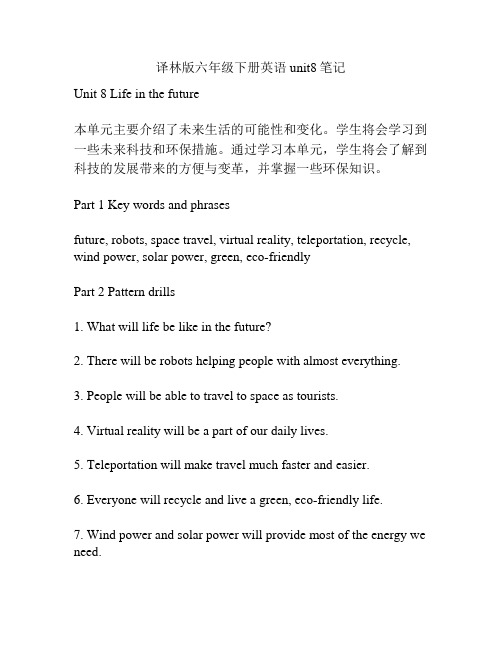
译林版六年级下册英语unit8笔记Unit 8 Life in the future本单元主要介绍了未来生活的可能性和变化。
学生将会学习到一些未来科技和环保措施。
通过学习本单元,学生将会了解到科技的发展带来的方便与变革,并掌握一些环保知识。
Part 1 Key words and phrasesfuture, robots, space travel, virtual reality, teleportation, recycle, wind power, solar power, green, eco-friendlyPart 2 Pattern drills1. What will life be like in the future?2. There will be robots helping people with almost everything.3. People will be able to travel to space as tourists.4. Virtual reality will be a part of our daily lives.5. Teleportation will make travel much faster and easier.6. Everyone will recycle and live a green, eco-friendly life.7. Wind power and solar power will provide most of the energy we need.Part 3 DialogueA: What do you think life will be like in the future?B: I think there will be robots helping people with almost everything.A: That’s true. I heard that people will be able to travel to space as tourists too.B: And virtual reality will be a part of our daily lives.A: That’s really cool. I also heard that teleportation will make travel much faster and easier.B: And everyone will recycle and live a green, eco-friendly life. A: Yes, I think wind power and solar power will provide most of the energy we need.Part 4 Let’s talk1. What will life be like in the future?2. Do you think robots will replace human beings in many jobs?3. Would you like to go to space as a tourist?4. What do you think of virtual reality?5. How do you recycle at home?Part 5 Culture TipsIn recent years, environmental protection has become an important issue in our daily life. In order to protect our planet, we should always remember to recycle and use eco-friendly products. We should also try our best to save energy by turning off lights and unplugging electronics when they are not in use. Finally, we should encourage others to do their part for the environment too!。
九年级上册英语各单元单词笔记人教版

九年级上册英语各单元单词笔记人教版一、Unit 11. 单词“textbook”,这是个超基础的单词啦,读音是[ˈtekstbʊk]。
它的出处呢,就是咱们日常的学习中经常会用到,解释就是课本咯。
造句的话,“We need to open our textbooks to page 10.”(我们需要把课本翻到第十页)。
近义词可以是“book”,反义词嘛,好像没有特别合适的。
2. “conversation”,读音是[ˌkɒnvəˈseɪʃn]。
这个词在我们日常交流中经常会用到,表示谈话、会话的意思。
比如“We had a great conversation last night.”(我们昨晚进行了一次很棒的谈话)。
近义词有“talk”“chat”。
二、Unit 21. “loudly”,读音[ˈlaʊdli]。
它是个副词,用来形容声音大的状态。
出处就在我们形容声音大小的时候咯。
解释就是大声地。
像“He shouted loudly.”(他大声地呼喊)。
反义词是“quietly”。
2. “pronunciation”,[prəˌnʌnsiˈeɪʃn]。
在学习英语的过程中,这个词很重要,就是发音的意思。
比如“Your pronunciation is very good.”(你的发音非常好)。
三、Unit 31. “patient”,[ˈpeɪʃnt]。
既可以作名词表示病人,也可以作形容词表示有耐心的。
出处很广泛啦,在医院或者形容人的性格的时候都会用到。
例如“As a teacher, you should be patient with students.”(作为一名教师,你应该对学生有耐心)。
作名词时,近义词是“sick person”,作形容词时,反义词是“impatient”。
2. “secret”,[ˈsiːkrət]。
意思是秘密。
可以说“I have a secret.”(我有一个秘密)。
人教版初中英语九年级1-3单元学霸笔记
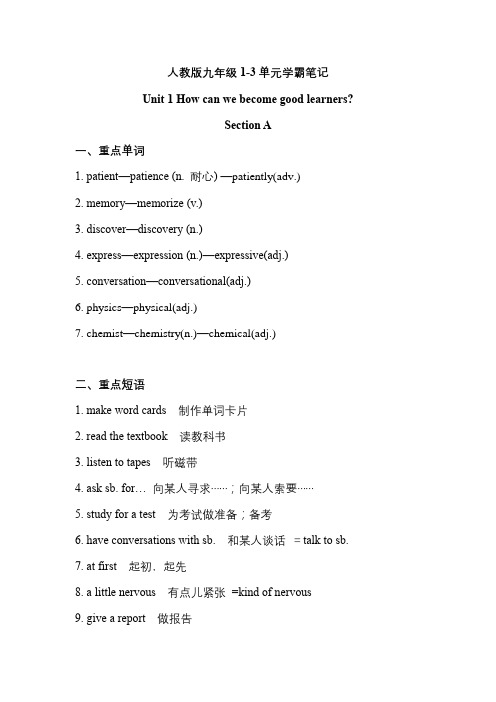
人教版九年级1-3单元学霸笔记Unit 1 How can we become good learners?Section A一、重点单词1. patient—patience (n. 耐心)—patiently(adv.)2. memory—memorize (v.)3. discover—discovery (n.)4. express—expression (n.)—expressive(adj.)5. conversation—conversational(adj.)6. physics—physical(adj.)7. chemist—chemistry(n.)—chemical(adj.)二、重点短语1. make word cards制作单词卡片2. read the textbook读教科书3. listen to tapes听磁带4. ask sb. for… 向某人寻求……;向某人索要……5. study for a test为考试做准备;备考6. have conversations with sb.和某人谈话=talk to sb.7. at first起初,起先8. a little nervous有点儿紧张=kind of nervous9. give a report做报告10. take notes记/做笔记11. word by word逐词地12. so…that如此……以至于13. write emails to sb.给某人写电子邮件14. repeat out loud大声重复15. be afraid to do sth. 害怕做某事=be afraid of doing sth.16. because of由于;因为=thanks to17. fall in love with爱上18. a piece of cake小菜一碟19. look up(在词典、参考书中或通过电脑)查阅;抬头看20. so that以便= in order that三、重点句子1. “你怎样学习英语?”“我通过向老师求助学习(英语)。
人教版九年级英语unit 8笔记

人教版九年级英语unit 8笔记I remember when I first studied Unit 8 in my ninth grade English class. The topic was about environmental protection and the importance of taking care of the earth. It was a very eye-opening unit for me, as I had never really thought about the impact of human activities on the environment before.我还记得当时我第一次在九年级英语课上学习第八单元。
那个话题是关于环境保护和珍惜地球的重要性。
对我来说,这是一个非常开眼界的单元,因为我以前从未真正思考过人类活动对环境的影响。
Learning about issues like pollution, deforestation, and climate change made me realize how urgent it is for us to start making changes in our daily lives to protect our planet. I started paying more attention to my own habits and how they contribute to environmental issues, such as using reusable bags instead of plastic ones and conserving water and energy whenever possible.学习有关污染、森林砍伐和气候变化等问题让我意识到我们迫切需要开始改变我们的日常生活,以保护地球。
人教版七年级上册英语第八单元笔记整理

第八单元主题:My family一、词汇1. Family (n.): 家庭2. Father (n.): 父亲3. Mother (n.): 母亲4. Parent (n.): 父母5. Grandfather (n.): 祖父6. Grandmother (n.): 祖母7. Brother (n.): 兄弟8. Sister (n.): 姐妹9. Uncle (n.): 叔叔10. Aunt (n.): 阿姨二、语法1. 形容词的比较级和最高级- 形容词的比较级和最高级的构成规则- 如何使用比较级和最高级表达不同的程度2. 物主代词- 形容词性物主代词(my, your, his, her, its, our, their)- 名词性物主代词(mine, yours, his, hers, its, ours, theirs)三、阅读理解1. 阅读一篇关于“我的家庭”的短文,理解文章中所介绍的家庭成员和家庭生活。
2. 回答问题,确认对文章内容的理解。
四、口语表达1. 描述自己的家庭成员,包括父母、兄弟姐妹以及祖父祖母等。
2. 描述自己家庭的生活状态,例如家庭成员的日常活动,家庭聚会等。
三、写作1. 根据老师要求,撰写一篇以“My family”为主题的短文,描述自己家庭的组成和家庭生活。
要求使用形容词的比较级和最高级。
四、附加学习1. 了解不同国家的家庭结构和习俗,比如我国、美国、英国等国家的家庭组成和家庭生活情况的差异。
2. 阅读相关资料,了解全球各国的家庭故事,拓宽视野,增加阅历。
以上是对人教版七年级上册英语第八单元的笔记整理,通过对单元内容的梳理和总结,相信对学生们的英语学习能够起到一定的帮助作用。
希望学生们能够在课堂上认真学习,课后多多复习,巩固所学知识。
通过努力,提高自己的英语水平,更好地与世界交流交流。
第八单元主题:My family五、语言点拓展1. 介绍家庭成员外貌特征- 描述家庭成员的外貌特征,如父母的眼睛颜色、祖父母的头发颜色等;- 通过形容词和比较级来进行描述,如“My father has the bluest eyes in the family”、“My sister is taller than me”。
八上英语8单元笔记
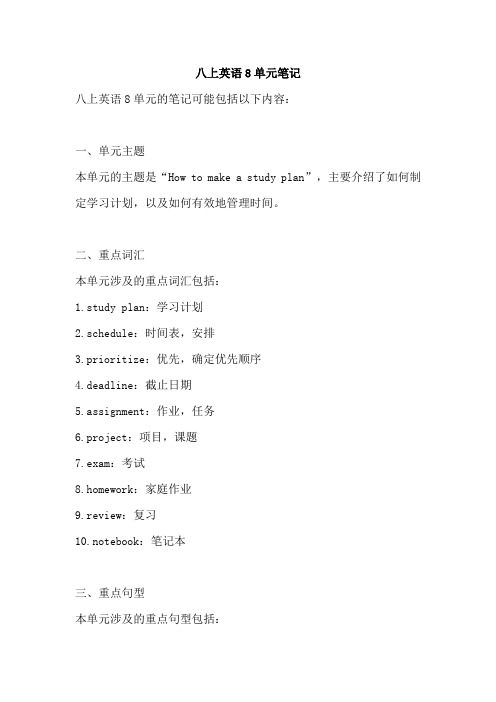
八上英语8单元笔记八上英语8单元的笔记可能包括以下内容:一、单元主题本单元的主题是“How to make a study plan”,主要介绍了如何制定学习计划,以及如何有效地管理时间。
二、重点词汇本单元涉及的重点词汇包括:1.study plan:学习计划2.schedule:时间表,安排3.prioritize:优先,确定优先顺序4.deadline:截止日期5.assignment:作业,任务6.project:项目,课题7.exam:考试8.homework:家庭作业9.review:复习10.notebook:笔记本三、重点句型本单元涉及的重点句型包括:1.How do you usually make a study plan? 你通常如何制定学习计划?2.I usually make a schedule to manage my time. 我通常制定时间表来管理我的时间。
3.What do you usually do first when making a study plan? 在制定学习计划时,你通常首先做什么?4.I usually prioritize my assignments and homework. 我通常优先处理作业和家庭作业。
5.When is the deadline for your project? 你的项目的截止日期是什么时候?6.How do you usually review your notes? 你通常如何复习笔记?What is your favorite study tool? 你最喜欢的学习工具是什么?7.Do you use a notebook for your studies? 你学习时使用笔记本吗?四、语法知识点本单元涉及的语法知识点包括一般现在时和现在进行时的用法。
通过例句和练习,学生可以进一步巩固这些语法知识。
五、文化知识点本单元还涉及了一些文化知识点,如不同国家的学习方式和时间管理方式。
八上英语八单元笔记
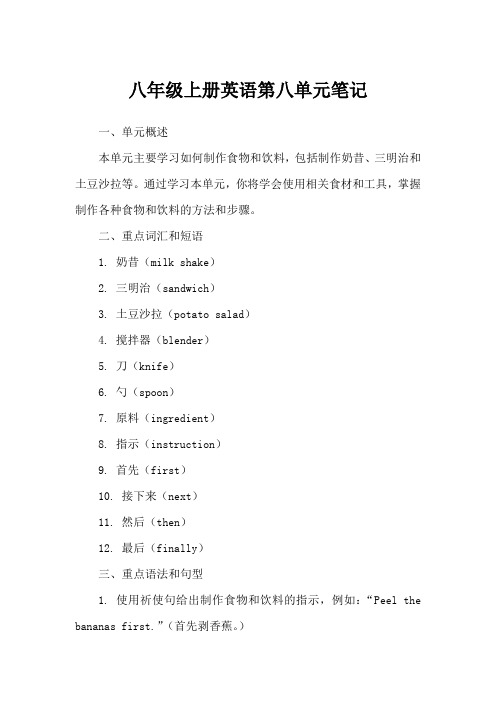
八年级上册英语第八单元笔记一、单元概述本单元主要学习如何制作食物和饮料,包括制作奶昔、三明治和土豆沙拉等。
通过学习本单元,你将学会使用相关食材和工具,掌握制作各种食物和饮料的方法和步骤。
二、重点词汇和短语1. 奶昔(milk shake)2. 三明治(sandwich)3. 土豆沙拉(potato salad)4. 搅拌器(blender)5. 刀(knife)6. 勺(spoon)7. 原料(ingredient)8. 指示(instruction)9. 首先(first)10. 接下来(next)11. 然后(then)12. 最后(finally)三、重点语法和句型1. 使用祈使句给出制作食物和饮料的指示,例如:“Peel the bananas first.”(首先剥香蕉。
)2. 使用first,next,then和finally等时间顺序词描述制作步骤,例如:“First,put the milk into the blender.”(首先,把牛奶放进搅拌器。
)3. 使用how many/how much询问所需原料的数量,例如:“How many bananas do we need?”(我们需要多少香蕉?)4. 使用there is/are句型描述所需原料,例如:“There are two cups of yogurt in the fridge.”(冰箱里有两杯酸奶。
)四、课文解析1. Section A主要介绍了如何制作奶昔和三明治。
通过对话和图片展示了所需原料和制作步骤。
重点练习使用祈使句和时间顺序词描述制作过程。
2. Section B主要学习了如何制作土豆沙拉。
通过听力练习和对话展示了所需原料和制作步骤。
重点练习使用how many/how much 询问和描述所需原料的数量。
3. Self Check部分通过练习题和小测验对本单元的知识点进行了复习和巩固。
五、学习建议1. 掌握本单元的重点词汇和短语,特别是与食物和饮料相关的词汇。
初三英语1至5单元重点知识总结
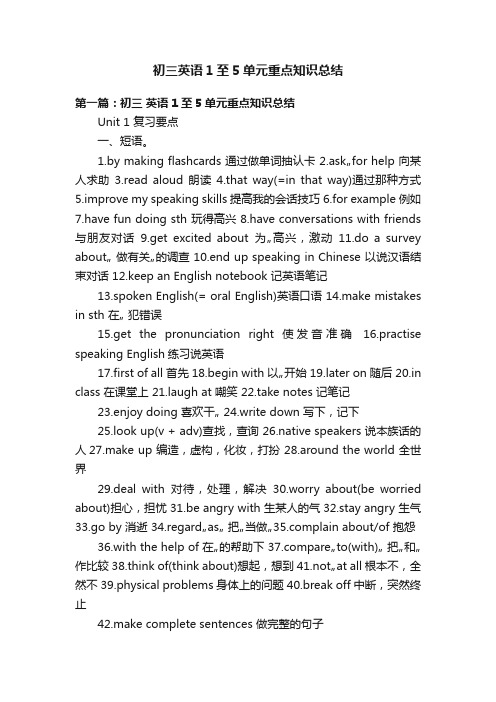
初三英语1至5单元重点知识总结第一篇:初三英语1至5单元重点知识总结Unit 1 复习要点一、短语。
1.by making flashcards 通过做单词抽认卡2.ask…for help 向某人求助3.read aloud 朗读4.that way(=in that way)通过那种方式5.improve my speaking skills 提高我的会话技巧6.for example 例如7.have fun doing sth 玩得高兴8.have conversations with friends 与朋友对话9.get excited about为…高兴,激动11.do a survey about… 做有关…的调查 10.end up speaking in Chinese 以说汉语结束对话 12.keep an English notebook 记英语笔记13.spoken English(= oral English)英语口语 14.make mistakes in sth 在… 犯错误15.get the pronunciation right 使发音准确16.practise speaking English练习说英语17.first of all 首先 18.begin with 以…开始 ter on 随后 20.in class 在课堂上 ugh at 嘲笑 22.take notes 记笔记23.enjoy doing 喜欢干… 24.write down 写下,记下25.look up(v + adv)查找,查询 26.native speakers 说本族话的人27.make up 编造,虚构,化妆,打扮 28.around the world 全世界29.deal with对待,处理,解决30.worry about(be worried about)担心,担忧 31.be angry with 生某人的气32.stay angry 生气33.go by 消逝34.regard…as… 把…当做…plain about/of 抱怨36.with the help of 在…的帮助下pare…to(with)… 把…和…作比较 38.think of(think about)想起,想到41.not…at all 根本不,全然不 39.physical problems 身体上的问题 40.break off 中断,突然终止42.make complete sentences 做完整的句子43.join 加入某团体并成为其中一员; join in与take part in指参加到某项活动中去。
九年级全一册英语九单元笔记

Unit 1。
Words & Expressions。
1. teenager n.青少年。
2. bully v.&n.欺负,恃强凌弱。
3. fit adj.健康的;合适的。
4. sense n.感觉;感官。
5. upset adj.心烦意乱的。
6. tendency n.倾向,趋势。
7. concentrate v.集中,全神贯注。
8. embarrass v.使…尴尬;使…窘迫。
9. panic v.&n.恐慌,惊慌。
10. relieve v.缓解;减轻。
11. run away 逃跑。
12. at least 至少。
13. in public 当众;公开。
14. all at once 突然。
15. suffer from 遭受;患…病。
16. be aware of 意识到。
17. have a sense of 感觉。
18. take pride in 以…而自豪。
19. have an impact on 对…有影响。
20. be determined to 决心做某事。
Grammar。
should。
1.作情态动词,表示“应该、劝告”,用于第一人称时,可表示建议、请求、劝告等。
You should work harder.2.用于第三人称时,表示应当、应该、大概会、可能性很大等,让步把握较小。
He should be here soon.Sentence Patterns。
1. It is important/necessary/helpful to do sth.做某事是重要/必要/有帮助的。
2. Teenagers should avoid bullying and be self-respecting at all times.青少年应该随时避免欺凌并尊重自己。
3. There is a tendency for teenagers to feel stressed and anxious.青少年有一种感到压力和焦虑的趋势。
- 1、下载文档前请自行甄别文档内容的完整性,平台不提供额外的编辑、内容补充、找答案等附加服务。
- 2、"仅部分预览"的文档,不可在线预览部分如存在完整性等问题,可反馈申请退款(可完整预览的文档不适用该条件!)。
- 3、如文档侵犯您的权益,请联系客服反馈,我们会尽快为您处理(人工客服工作时间:9:00-18:30)。
初三英语第8单元学习笔记一.知识点:短语动词小结常见短语动词结构有下面几种:1.动词+副词如:give up 放弃turn off 关掉stay up 熬夜这种结构有时相当于及物动词,如果其宾语是代词,就必须放在动词和副词之间,如果是名词,则既可插在动词和副词之间,也可放在短语动词后。
2. 动词+介词如:listen of 听look at 看belong to 属于这种结构相当于及物动词,后面跟宾语。
3. 动词+副词+介词如:come up with 提出,想出run out of 用完,耗尽4. 动词+名词(介词) 如:take part in参加catch hold of 抓住1.cheer (sb.) up 使(某人)高兴、振作如:cheer me up 使我高兴clean up 打扫clean-up n. 打扫2. homeless adj. 无家可归的 a homeless boy 一个无家可归的男孩home n. 家4. sick adj. 生病的作表语、定语ill adj. 生病的作表语,不能作定语5. volunteer to do v. 志愿效劳、主动贡献volunteer n. 志愿者6. come up with 提出想出=== think up 想出catch up with 赶上追上7. put off doing 推迟做某事put on 穿上(指过程)put up 张贴8. write down 写下记下9. call up 打电话make a telephone call 打电话10. set up 成立建立The new hospital was set up in 2000. 这座医院是在2000年成立的。
11. each 每个各自的强调第一个人或事物的个别情况常与of 连用every 每个每一个的一切的则有“全体”的意思不能与of 连用12. put …to use 把…投入使用,利用They put the new machine to use. 他们把新机器投入使用13. help sb. (to) do 帮助某人做某事help him (to) studyhelp sb. with sth. 帮助某人做某事help him with Englishhelp do 帮助做某事help study14. plan to do 计划做某事plan + 从句I plan to go to Beijing. === I plan (that) I will go to Beijing.我计划去北京。
15. spend …doing 花费…做…I spent a day visiting Beijing.我花了一天的时间去参观北京。
spend…on sth. 花费…在…I spent 3 years on English.16.not only …but (also) …不但…而且…用来连接两个并列的成分(1)引导以not only …but (also)…开头的句子往往引起部分倒装。
因此⑴Not only do I feel good but (also)…. 是倒装句。
也是说得要把前面的句子中的助动词或者是情态动词放在主语的前面。
如:①Not only can I do it but (also) I can do best.我不仅能做到而且做得最好。
⑵Not only…but (also)…接两主语时,谓语动词随后面的主语人称和数的变化也就是就近原则如:①Not only Lily but (also) you like cat. 不仅莉莉而且你也喜欢猫。
②Not only you but (also) Lily likes cat. 不仅你而且莉莉喜欢猫。
常见的就近原则的结构有:①Neither…nor…即不…也不…(两者都不)Neither you nor I like him. 我和你都不喜欢他。
②Either…or…不是…就是…(两者中的一个)Either Lily or you are a student.③Not only …but (also)…④There be17. join 参加(指参加团体、组织) 如:join the Party 入党take part in 参加(指参加活动) 如:take part in sports meeting 参加运动会18. run out 与run out of①run out (become used up). 其主语往往为物。
如时间,食物,金钱,油等,本身就含有被动意义。
His money soon ran out. 他的钱很快就花光了。
My patience has completely run out. 我没有一点耐心了。
Our time is running out. 我们剩下的时间不多了。
②run out of 主语为人,表示主动含义。
He is always running out of money before pay day. 他总是在发工资的日子还没有到就把钱花完了。
两者在一定条件下可以互换如:The petrol is running out. 汽油快用完了= We are running out of petrol. 我们快把汽油用完了。
Our time is running out. 我们剩下的时间不多了。
= We are running out of time19. take after (在外貌、性格等方面)与(父母等)相像be similar to 与..相像take after 相像look after 照顾take care of 照顾20. work out v. + adj.①结局,结果为The strategies that he came up with worked out fine. 他提出的这个策略效果很好。
②算出,制订出,消耗完(精力等)He never seems to be worked out. 他好像永远不会疲乏似的。
He worked out a plan. 他制订了一个计划。
I have worked out our total expenses. 我已经算出了我们总的费用。
21. hang out 闲荡闲逛I like to hang out at mall with my friends. 我喜欢和我的朋友一起去购物中心闲荡。
22. be able to do 能会be unable to do 不能不会23. thank you for doing 谢谢做某事如:thank you for helping me 谢谢做帮助我24. for sure 确实如此,毫无疑问You don’t have money. That’s for sure. 你没有钱,这是毫无疑问的。
25. fill…with…使…充满…用…填充…She filled the bowl with water. 她用水填满碗。
26. like prep. 像…27. help sb. out 帮助…做事,解决难题(摆脱困境)I can’t work out this math problem. Please help me out.我不能算出这道数学问题,请你帮我解决。
28. train n. 火车train v. 训练train sb. to do. 训练某人做某事She trains her dog to fetch things. 她训练她的狗去取东西。
29. at once == right away 立刻马上如:Do it at once. 马上去做。
I’ll go there at once/ right away. 我马上去那里。
30. one day 有一天(指将来/过去) some day 有一天(指将来) 如:One day I went to Beijing. 有一天我去了北京。
Some day I’ll go to Beijing. 有一天我将去北京。
31. specially adv. 特意地专门地特别地special adj. 特别的32. donation n. 捐赠物donate v. 捐赠赠送33. part of speech 词性词类34. disabled adj. 肢体有残疾的disable v. 不能35. hand out 分发hand out bananasgive out 分发give out sth to sb. 分….给某人give up doing 放弃…give up smoking 放弃吸烟give away 赠送捐赠give away sth. to …. give away money to kidsgive sb. sth. 给某人某东西give me money 给我钱give sth. to sb. 给某人某东西give money to me 给我线36. volunteer ①可数名词“志愿者”②adj. 自愿的vi. volunteer to do sthThey are the Chinese People’s Volunteers. 他们是中国人民志愿军。
I volunteer to help you. 我自愿帮助你。
37. no longer = not …any longer 指时间上不再延续。
no more = not …any more 指动作上不再延续。
三.句子1.We can’t put off making a plan. Clean-up Day is only two weeks fromnow. 我们不能推迟制订计划,清洁日离现在只有两周了。
2.She puts this love to good use by working in the after-school care centre at her local elementary school. 她在当地的一所小学的课后辅导中心工作,使这个爱好得到较好的利用3.Not only do I feel good about helping other people, but I get to spend time doing what I love to do. 帮助别人不但自己感到快乐,而且我开始花时间做自己喜欢做的事了。
4.The three students plan to set up a student volunteer project at heir school. 这三个学生计划在他们校开展一个学生志愿者项目。
